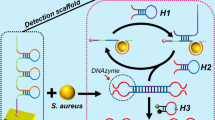Abstract
Multilocus sequence typing (MLST) is used by the Scottish Meningococcus and Pneumococcus Reference Laboratory (SMPRL) as a routine method for the characterization of certain bacterial pathogens. The SMPRL recently started performing MLST on strains of Streptococcus pneumoniae, and here we describe a fully automated method for MLST using a 96-well-format liquid-handling robot and a 96-capillary automated DNA sequencer.
Similar content being viewed by others
References
Maiden, M.C., Bygraves, J. A., Feil, E., et al. (1998) Multilocus sequence typing: A portable approach to the identification of clones within populations of pathogenic microorganisms. Proc. Natl. Acad. Sci. USA 95, 3140–3145.
Enright, M.C. and B.G. Spratt (1998) A multilocus sequence typing scheme for Streptococcus pneumoniae: Identification of clones associated with serious invasive disease. Microbiology 144(Pt 11), 3049–3060.
Clarke, S.C., M.A. Diggle, and G.F. Edwards (2001) Semiautomation of multilocus sequence typing for the characterisation of clinical isolates of Neisseria meningitidis. J. Clin. Microbiol. 39, 3066–3071.
Smart, L.E. (1986) Serotyping of Streptococcus pneumoniae strains by coagglutination. J. Clin. Pathol. 39, 328–331.
Smart, L.E. and J. Henrichsen (1986) An alternative approach to typing of Streptococcus pneumoniae strains by coagglutination. Acta. Pathol. Microbiol. Immunol. Scand. [B]. 94, 409–413.
Clarke, S.C. and M.A. Diggle (2002) Automated PCR/sequence template purification. Mol. Biotechnol. 21, 221–224.
Diggle, M.A. and S.C. Clarke (2002) Rapid assignment of nucleotide sequence data to allele types for multi-locus sequence analysis (MLSA) of bacteria using an adapted database and modified alignment program. J. Mol. Microbiol. Biotechnol. 4, 515–517.
Clarke, S.C., Denham, B.C., Reid, J.A., et al. (2002) Pneumococcal disease in Scotland 1999. SCIEH Weekly Rep. 36, 62–63.
Kalin, M. (1998) Pneumococcal serotypes and their clinical relevance. Thorax 53, 159–162.
Scott, J.A., et al. (1996) Serogroup-specific epidemiology of Streptococcus pneumoniae: Associations with age, sex, and geography in 7,000 episodes of invasive disease. Clin. Infect. Dis. 22, 973–981.
Author information
Authors and Affiliations
Corresponding author
Rights and permissions
About this article
Cite this article
Jefferies, J., Clarke, S.C., Diggle, M.A. et al. Automated pneumococcal MLST using liquid-handling robotics and a capillary DNA sequencer. Mol Biotechnol 24, 303–307 (2003). https://doi.org/10.1385/MB:24:3:303
Issue Date:
DOI: https://doi.org/10.1385/MB:24:3:303




